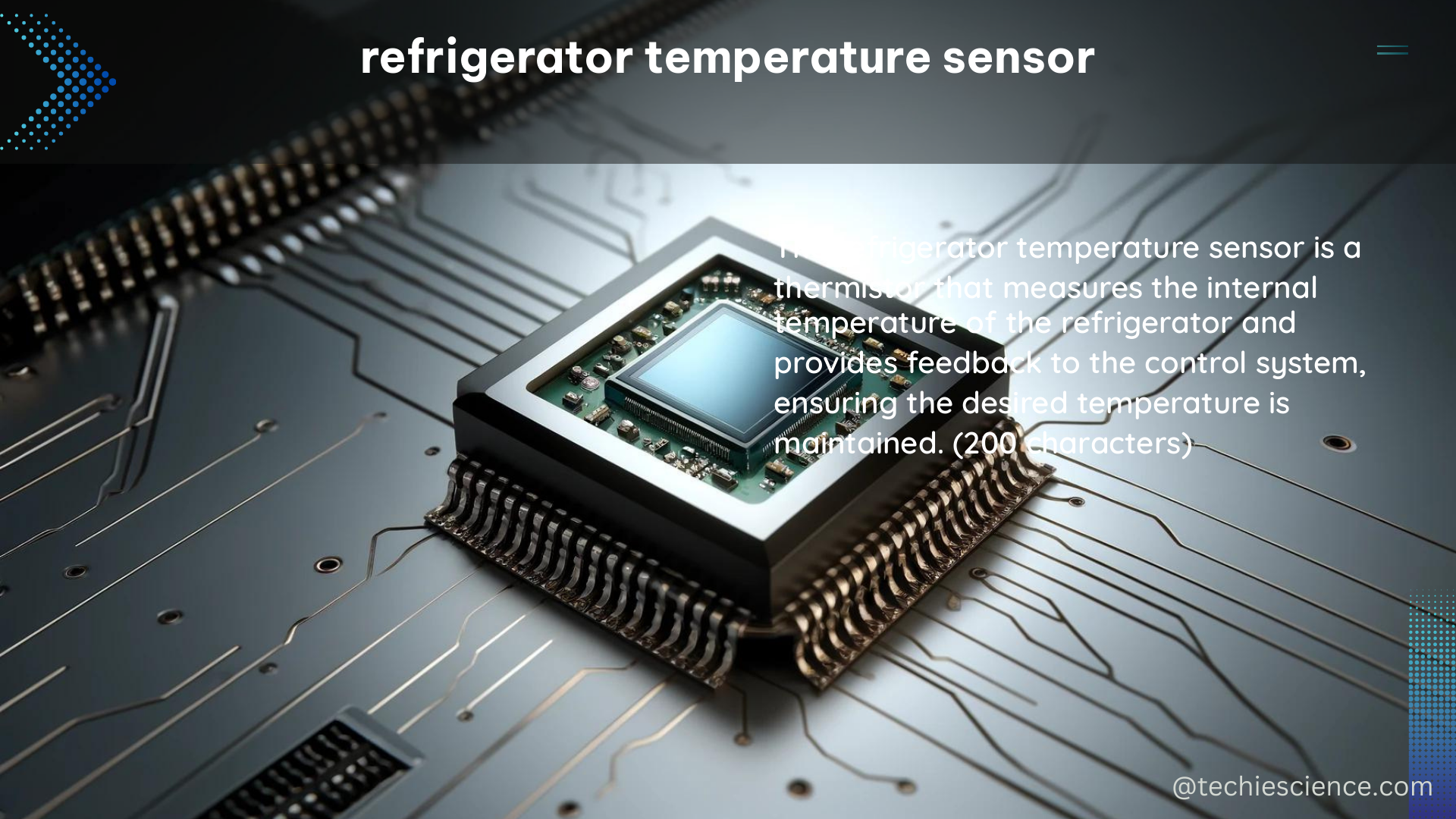The refrigerator temperature sensor is a critical component that ensures the optimal temperature for storing food and beverages. Maintaining the correct temperature range is essential to prevent bacterial growth and food spoilage. This comprehensive guide will delve into the technical details and advanced features of refrigerator temperature sensors, providing a valuable resource for DIY enthusiasts and professionals alike.
Understanding Refrigerator Temperature Ranges
The ideal temperature range for a refrigerator is between 35°F (1.67°C) and 38°F (3.33°C). This temperature range is crucial for preserving the freshness and safety of stored food and beverages. Temperatures outside this range can lead to the rapid growth of harmful bacteria, such as Listeria, Salmonella, and E. coli, which can cause foodborne illnesses.
According to a study conducted by the National Institute of Standards and Technology, the temperature stability of a refrigerator can be significantly affected by the thermal ballast load. The study found that a thermal ballast load comprising 10-15% of the total refrigerator storage volume can have a measurable impact on temperature stability.
To ensure accurate temperature monitoring, the study utilized Type T thermocouples, which were calibrated at the melting point of ice (0°C) before use. The uncertainty of the temperature measurement system was calculated to be 0.15°C (k = 2), ensuring a high level of precision.
Refrigerator Temperature Sensor Technologies

Refrigerator temperature sensors come in various forms, each with its own unique features and capabilities. Here are some of the most common types of refrigerator temperature sensors:
Thermistor Sensors
Thermistors are temperature-sensitive resistors that change their resistance in response to temperature changes. They are widely used in refrigerators due to their high accuracy, fast response time, and low cost. Thermistors can typically measure temperatures ranging from -40°C to 125°C with an accuracy of ±0.5°C.
Resistance Temperature Detectors (RTDs)
RTDs are temperature sensors that use the change in electrical resistance of a metal (typically platinum) to measure temperature. RTDs offer excellent accuracy, stability, and repeatability, making them suitable for critical temperature monitoring applications. They can measure temperatures from -200°C to 850°C with an accuracy of ±0.1°C.
Thermocouple Sensors
Thermocouples are temperature sensors that generate a small voltage in response to temperature changes. They are known for their wide temperature range, ruggedness, and low cost. Thermocouples can measure temperatures from -270°C to 1,800°C, with an accuracy typically ranging from ±0.5°C to ±2.2°C.
Semiconductor Temperature Sensors
Semiconductor temperature sensors, such as integrated circuit (IC) sensors, use the temperature-dependent characteristics of semiconductor materials to measure temperature. These sensors offer high accuracy, fast response time, and easy integration with digital control systems. They can measure temperatures from -55°C to 150°C with an accuracy of ±0.5°C.
Refrigerator Temperature Monitoring Solutions
Monitoring the temperature inside a refrigerator is crucial for maintaining food safety and quality. Here are some popular refrigerator temperature monitoring solutions:
Zigbee-based Sensors
Zigbee-based temperature/humidity sensors, such as the Aqara sensor, are a popular choice for refrigerator temperature monitoring. These sensors require a Zigbee hub and compatible software to track temperature readings and send notifications to the user’s phone if the temperature goes above a certain threshold.
WiFi-based Sensors
Alternatively, users can opt for WiFi-based temperature monitoring solutions, such as using a Wemos D1 mini (ESP8266) and a temperature/humidity sensor. This approach eliminates the need for batteries and a hub, as the sensor can directly connect to the home’s WiFi network.
Remote Monitoring Systems
In the medical and health industry, remote refrigerator temperature monitoring systems are essential for maintaining safe and effective storage. These systems can send alarms via email, phone call, or text message when the temperature veers out of the pre-programmed limit. They also provide data logging capabilities to prove compliance with regulatory requirements.
Refrigerator Temperature Variability
A study conducted in Poland surveyed the domestic refrigerator storage temperatures of 77 participants. The study found that the mean working temperature was 5.1°C with a standard deviation of 2.8°C. Notably, 49.35% of the tested refrigerators had a mean working temperature of over 5°C, and 3.9% exceeded 10°C. The study also revealed that the temperature variability can range from 0.3°C to 3.7°C within a single refrigerator.
These findings highlight the importance of accurate temperature monitoring and the need for refrigerator temperature sensors that can reliably detect and report temperature fluctuations. By understanding the typical temperature ranges and variability, users can better optimize their refrigerator settings and ensure the safety and quality of stored food and beverages.
Conclusion
The refrigerator temperature sensor is a critical component that plays a vital role in maintaining the optimal temperature for storing food and beverages. By understanding the technical details and advanced features of these sensors, users can make informed decisions and implement effective temperature monitoring solutions.
Whether you’re a DIY enthusiast or a professional in the medical or health industry, this comprehensive guide has provided you with the necessary information to navigate the world of refrigerator temperature sensors. By leveraging the right technology and monitoring solutions, you can ensure the safety and quality of your stored items, ultimately contributing to a healthier and more sustainable food storage environment.
Reference:
– Thermal Ballast Load Effect on Domestic Refrigerator Temperature Stability
– Temperature Sensor for My Refrigerator
– Domestic Refrigerator Storage Temperatures in Poland
– Refrigerator Temperature Monitoring Systems: A Comprehensive Guide
– How to Monitor Commercial Refrigerator Temperatures

The lambdageeks.com Core SME Team is a group of experienced subject matter experts from diverse scientific and technical fields including Physics, Chemistry, Technology,Electronics & Electrical Engineering, Automotive, Mechanical Engineering. Our team collaborates to create high-quality, well-researched articles on a wide range of science and technology topics for the lambdageeks.com website.
All Our Senior SME are having more than 7 Years of experience in the respective fields . They are either Working Industry Professionals or assocaited With different Universities. Refer Our Authors Page to get to know About our Core SMEs.